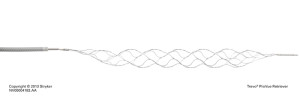
The US Food and Drug Administration (FDA) has allowed marketing of two Trevo (Stryker Neurovascular) clot retrieval devices as an initial therapy for ischaemic strokes to reduce paralysis, speech difficulties and other stroke disabilities.
According to a press release, these devices should be used within six hours of symptom onset and only following treatment with tissue plasminogen activator, which needs to be given within three hours of symptom onset.
“This is the first time the FDA has allowed the use of these devices alongside tissue plasminogen activator, which has the potential to help further reduce the devastating disabilities associated with strokes compared to the use of tissue plasminogen activator alone,” says Carlos Peña, director of the division of neurological and physical medicine devices at the FDA’s Center for Devices and Radiological Health. “Now health care providers and their patients have another tool for treating stroke and potentially preventing long-term disability.”
The Trevo device was first cleared by the FDA in 2012 to remove blood clots and restore blood flow in stroke patients who could not receive tissue plasminogen activator or for those patients who did not respond to tissue plasminogen activator therapy. Today’s action expands the devices’ indication to a broader group of patients.
According to the release, the FDA evaluated data from a clinical trial comparing 96 randomly selected patients treated with the Trevo device along with tissue plasminogen activator and medical management of blood pressure and disability symptoms with 249 patients who had only tissue plasminogen activator and medical management. Twenty-nine per cent of patients treated with the Trevo device were functionally independent (ranging from no symptoms to slight disability) three months after their stroke, compared to 19% of patients who were not treated with the Trevo device.
Risks associated with using the Trevo device include a failure to retrieve the blood clot, device malfunctions including breakage and navigation difficulties, which can potentially damage blood vessels and cause perforation or haemorrhage.
The FDA reviewed the data for Trevo for stroke treatment through the de novo premarket review pathway.









